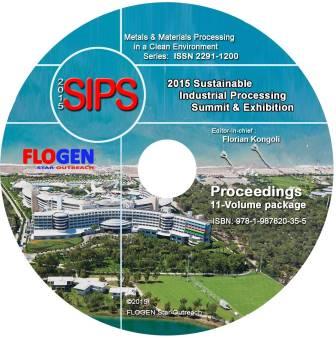2015-Sustainable Industrial Processing Summit
SIPS 2015 Volume 4: Meech Intl. Symp. / Mining Operations
| Editors: | Kongoli F, Veiga MM, Anderson C |
| Publisher: | Flogen Star OUTREACH |
| Publication Year: | 2015 |
| Pages: | 275 pages |
| ISBN: | 978-1-987820-27-0 |
| ISSN: | 2291-1227 (Metals and Materials Processing in a Clean Environment Series) |

< CD shopping page
Social Risk in the Extractives Sector: Do Miners Need New Skills to Be Successful?
Jocelyn Fraser1; Andre Xavier2;1NBK INSTITUTE OF MINING ENGINEERING, UNIVERSITY OF BRITISH COLUMBIA, Vancouver, Canada; 2UBC-MINING, Vancouver, Canada;
Type of Paper: Regular
Id Paper: 471
Topic: 4
Abstract:
The past five years have been a tumultuous time in the global mining sector. Declining commodity prices, revenues and profits; increasing capital costs and debt levels; and the reality of mining lower grade deposits, often in remote areas, have been problematic for project teams around the world. The traditional financial and environmental risk factors were exacerbated during this period by an exponential rise in the number of mining-community conflicts (ICMM as cited in Goldfields, 2014), and in the need to earn the trust of a myriad of different groups who have earned the right to be classified as stakeholders in mining projects.
Research published in 2014 indicates that lack of social acceptance is now a leading – and costly - cause of delays for mining projects (Davis & Frank, 2014). This suggests that building successful mines requires more than superior technical, environmental and financial expertise. It also requires specialized skills to work effectively with those living in communities next to where resources are located.
This paper will consider the skills required for successful mine development, arguing that project team members require strong emotional intelligence (EQ) to enable their technical expertise to be appreciated. A media analysis of recent situations of mining company-community conflict will be undertaken to test the hypothesis that most incidents of social risk in the mining sector are driven by non-technical issues and the authors will discuss how the five attributes of EQ defined by Daniel Goleman -self-awareness, self-management, internal motivation, empathy and social skills – could add value to project teams, be used to mitigate social risk to mining projects, optimize performance and identify opportunities for partnerships to create co-benefits.